 Petzlover
Petzlover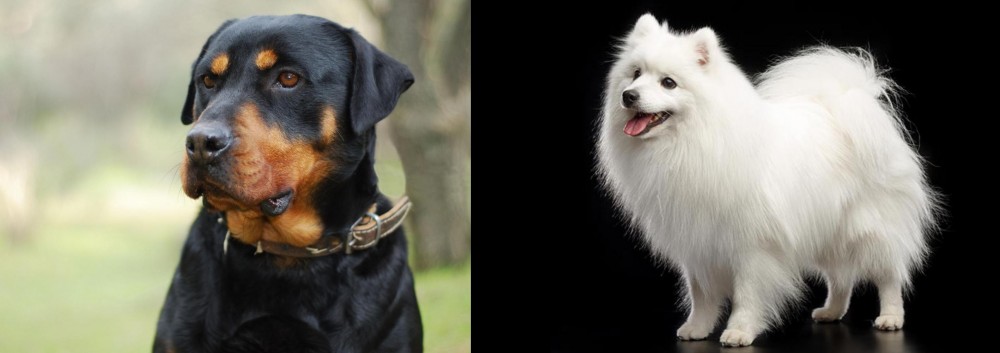 Rottweiler is originated from Germany but Japanese Spitz is originated from Japan. Rottweiler may grow 35 cm / 14 inches higher than Japanese Spitz. Rottweiler may weigh 50 kg / 111 pounds more than Japanese Spitz. Rottweiler may live 5 years less than Japanese Spitz. Rottweiler may have more litter size than Japanese Spitz. Both Rottweiler and Japanese Spitz requires Low Maintenance.
Rottweiler is originated from Germany but Japanese Spitz is originated from Japan. Rottweiler may grow 35 cm / 14 inches higher than Japanese Spitz. Rottweiler may weigh 50 kg / 111 pounds more than Japanese Spitz. Rottweiler may live 5 years less than Japanese Spitz. Rottweiler may have more litter size than Japanese Spitz. Both Rottweiler and Japanese Spitz requires Low Maintenance.
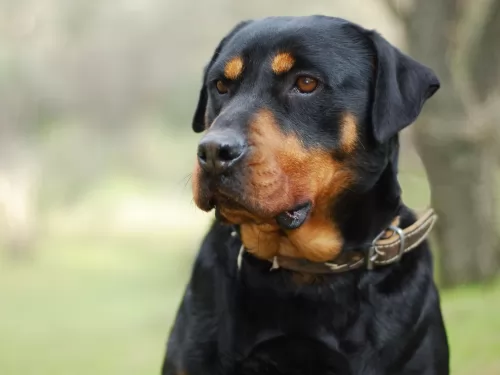 It is beleived to be the Rottweiler has been developed from the Roman cattle dogs. The Roman empire made a camp in a place at Germany in 74 AD. The area was called as 'das Rote Wil' and later as 'Rottweil'. In the middle ages Rottweiler was used in bear hunting and as a cattle dog. In 1899 the International club for Leonbergers and Rottweiler dogs was formed in Germany. In 19th century due to set in of railways the cattle was moved by railways and the need for the breed declined. When the world war was set in there came a heavy demand for police dogs. Rottweilers played a major role in first and second world war.
It is beleived to be the Rottweiler has been developed from the Roman cattle dogs. The Roman empire made a camp in a place at Germany in 74 AD. The area was called as 'das Rote Wil' and later as 'Rottweil'. In the middle ages Rottweiler was used in bear hunting and as a cattle dog. In 1899 the International club for Leonbergers and Rottweiler dogs was formed in Germany. In 19th century due to set in of railways the cattle was moved by railways and the need for the breed declined. When the world war was set in there came a heavy demand for police dogs. Rottweilers played a major role in first and second world war.
In 1921 many German Rottweiler clubs joined together to form ADRK, which is Allgemeiner Deutscher Rottweiler Klub. This is said to be the home club of Rottweiler. American kennel club recognised them in 1931. They become 9th most popular breed in America in 2013.
 Spitz dogs include quite a few dog breeds and these dogs all have similar characteristics – pointed, erect ears, slanted type eyes with thick fur.
Spitz dogs include quite a few dog breeds and these dogs all have similar characteristics – pointed, erect ears, slanted type eyes with thick fur.
The Japanese Spitz was developed by Japanese breeders at the time of the 1920s, and bringing in quite a number of dog breeds to do so. The breeders started with the white German Spitz dogs but later other white Spitz breeds were imported and crossed into this developing breed.
The final standard for the breed after World War 11 was accepted by the Japan Kennel Club. The dog became recognized by other kennel clubs of the world.
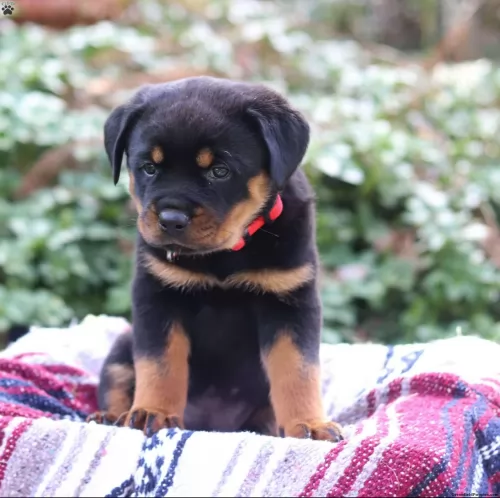 Rottweilers are good natured, obedient and are very much eager to work. They are calm, confident and an excellent watchdog. They will not make friends immediately. Rottweilers can be said as an all purpose dog since they are suitable as companion and watch dog as well. He is good in herding and guarding as genital feature. Rottweiler must be trained from its younger stage and should not be hit while training. They have high energy level and thus they are interested in doing work if properly trained. There are more possibilities of biting the strangers because of watchdog tendency.
Rottweilers are good natured, obedient and are very much eager to work. They are calm, confident and an excellent watchdog. They will not make friends immediately. Rottweilers can be said as an all purpose dog since they are suitable as companion and watch dog as well. He is good in herding and guarding as genital feature. Rottweiler must be trained from its younger stage and should not be hit while training. They have high energy level and thus they are interested in doing work if properly trained. There are more possibilities of biting the strangers because of watchdog tendency.
They are very good in herding sheeps as they have a natural gathering style. They are clever and adjusts the barking sound according to the situation. While herding they used to prove the leadership by selecting the dominant one in the flock and challenging it. If they were made to watch a same flock of cattle regularly, then they will develop a bond with them and will be affectionate with them as long as the cattle obeys its commands.
 The Japanese Spitz is a small to medium sized dog, being somewhat larger than the Pomeranian. The dog stands at 25 – 38cm, both male and female and weighs anything between 5 to 10kg.
The Japanese Spitz is a small to medium sized dog, being somewhat larger than the Pomeranian. The dog stands at 25 – 38cm, both male and female and weighs anything between 5 to 10kg.
The double coat of the dog is thick and white and the puppies look like large snowball.s He has a pointed muzzle with erect ears and a tail that curls up over the back.
The pure-bred Japanese Spitz, just like other Spitz dogs are smart, inquisitive dogs who show loyalty to their owners, getting on well with children in the home and making a good family pet.
They can be quite stubborn, so training and socialization becomes important if you want him to be obedient. Training is easy as he is an intelligent, bright little dog.
They’re able to adapt to life in the city or in the country, but if you live in the city, you will need to meet his exercise needs.
He can tolerate cold weather quite well but as a companion dog, he prefers being indoors with his human family.
Even though they are small dogs, they are protective and make good watchdogs. They were bred to be companion dogs and they take this role seriously, being loyal, entertaining, fun, friendly and loving with their human family.
It is why they are becoming such a popular breed as they have an amicable nature, getting on well with other pets as well as children.
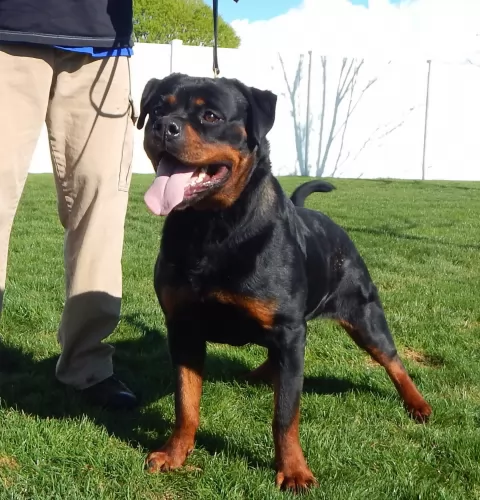 They are friendly with children and enjoy the company with them. But it is not advised to leave them with children without adult supervision.
They are friendly with children and enjoy the company with them. But it is not advised to leave them with children without adult supervision.
Rottweilers do not make friends immediately but take time to know about new people. He is an excellent watchdog. Males are quiet in nature but are watchful and females are more affectionate and obey some more. A good training is required for them to obey your orders.
They are not good for apartment life and thus a fenced back yard will be better for them to play and spend the energy. They require companion and will be happy to walk around with you. Hot weather will be some what better for them when compared with cold.
Rottweilers are easy to train because of their high intelligence. The training should be started in their young stage to have best results. They should not be dominated but treated kindly with understanding. They should be comfortable with the surroundings and people. Giving him a reward for training will make him interested in doing it. If he does a mistake then he should not be hit, so that he may get fear and loss his interest in doing it. Punishments will never work for them but rewarding will make him encouraged. Simple commands such as sit and stand shall be taught to them.
 Your Japanese Spitz is going to make you a superb companion and you want to ensure that you are well prepared for him when he arrives. He is feisty, charming, social, bright, alert, active, loyal and loving and you want to be sure that he has everything laid on as a 4-legged family member.
Your Japanese Spitz is going to make you a superb companion and you want to ensure that you are well prepared for him when he arrives. He is feisty, charming, social, bright, alert, active, loyal and loving and you want to be sure that he has everything laid on as a 4-legged family member.
He isn't a high maintenance dog, he isn't demanding and if you love and care for him, you'll find that he fills a vacancy in your life that you'll never want to be without again.
 The health issues affecting the eyes of them are Cataract and Progressive Retinal Atropy. Health problems common in their joints are Hip Dysplasia, Elbow Dysplasia and Panosteitis. They also have chances to get circulatory system problems like Aortic Stenosis and Von Willebrand's Disease. Other common health problems in Rottweiler are Bloat and Cancer.
The health issues affecting the eyes of them are Cataract and Progressive Retinal Atropy. Health problems common in their joints are Hip Dysplasia, Elbow Dysplasia and Panosteitis. They also have chances to get circulatory system problems like Aortic Stenosis and Von Willebrand's Disease. Other common health problems in Rottweiler are Bloat and Cancer.
Mostly people think that Rottweilers don't shed but they are short haired dog and sheds more. They are having double coat that is undercoat and topcoat. The undercoat is softer and protects them in winter and topcoat is rougher and visible. It is said that they will shed in spring and winter seasons. Shedding can be reduced by brushing them.
 Life expectancy for the Japanese Spitz is about 10–16 years. They are a healthy breed with few genetic problems. Nothing is set in stone though, and your healthy dog can fall prey to some of the many common dog illnesses there are.
Life expectancy for the Japanese Spitz is about 10–16 years. They are a healthy breed with few genetic problems. Nothing is set in stone though, and your healthy dog can fall prey to some of the many common dog illnesses there are.
They're so sweet, you're tempted to feed him treats all the time, but obesity is a common Japanese Spitz health issue and obesity can lead to many problems with the heart, kidney, diabetes and even joint pain.
Also, eye problems such as ingrown eyelashes and a lower eyelid that rolls inward are problems that are known to trouble these Spitz type dogs. It leads to terrible irritation and damage to the eye. It's definitely time to see the vet to avoid infections and injury.
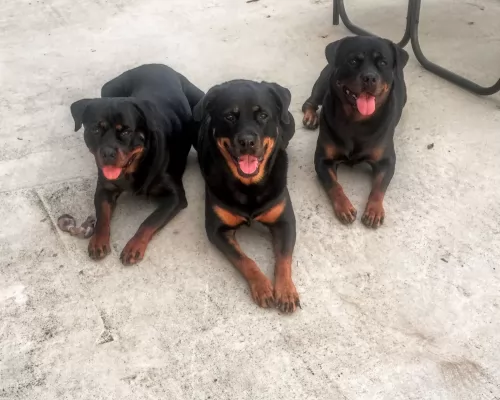 Rottweiler puppies should be given a diet which has protein, carbohydrates and fats. They need different diets in their growing stages. They can be given chicken with bones and vegetables for 4 days in a week. Beef with vegetables can also be given. When feeding them red meat a raw meaty bone can also be included. Fish oil can be given such that starting with 1000 mg and making it to 3000 mg in a time of two weeks.
Rottweiler puppies should be given a diet which has protein, carbohydrates and fats. They need different diets in their growing stages. They can be given chicken with bones and vegetables for 4 days in a week. Beef with vegetables can also be given. When feeding them red meat a raw meaty bone can also be included. Fish oil can be given such that starting with 1000 mg and making it to 3000 mg in a time of two weeks.
High calories of protein should be provided to them to meet their energy requirements. While buying commercial food it should be checked for the main ingredient to be meat. Protein levels should be more from animals than vegetables. High quality dairy products should be included. Food should not have low quality flavours and preservatives. Healthy fat is necessary for their skin and coat. If these fats are not provided it will cause dandruff and itchy skin.
Brushing them weekly once is recommended for their coat and skin. Buying the puppy from reputable breeder will be better. Vaccinations and preventive medicines should be given on right time. Spaying and Neutering should be done to avoid unwanted pregnancy. High quality diet should be maintained. Making them to bath once in a week is advisable. Nails should be trimmed once in every two weeks.
Rottweilers like to chase something and Laser pointer will be a good game for them. It will make them busy and also entertain us. But it should be on a limit and they should not get bored. A treat or toy can be hided and they can be made to find it. A bottle should be filled with water and frozen. The frozen bottle can be given to them for playing. In summer time it will make them very happy to play with it. A ball or toy can be thrown and they can be made to fetch it. Walking them is also a good exercise.
 The Japanese Spitz is an active dog and he will require at least one walk a day to keep him happy. He is full of beans and wants to go with you on all your outings.
The Japanese Spitz is an active dog and he will require at least one walk a day to keep him happy. He is full of beans and wants to go with you on all your outings.
The diet of your Japanese Spitz is basic to his good health. If you feed him low quality foods deplete of vitamins and minerals, you'll end up with a sick dog who is always at the vet. Puppies need 4 small meals a day while an adult dog can have 1 or 2 meals a day.
He can benefit from the top quality commercially manufactured foods and sometimes you can add in some cooked chicken, rice and vegetables into his dry kibble. Add in a little bit of raw meat too from time to time and ensure that he can always reach his bowl of fresh, cool water.
The beautiful white fur of your Japanese Spitz will need to be brushed at least twice a week to keep it free from loose hair and to keep the fur bright and vibrant.
Check his nails and avoid them getting too long as they can hook on things and cause injury. Check his ears inside and out, keeping them clean and free of debris. Very importantly, keep his teeth clean as dental disease can play havoc with a dog's health.